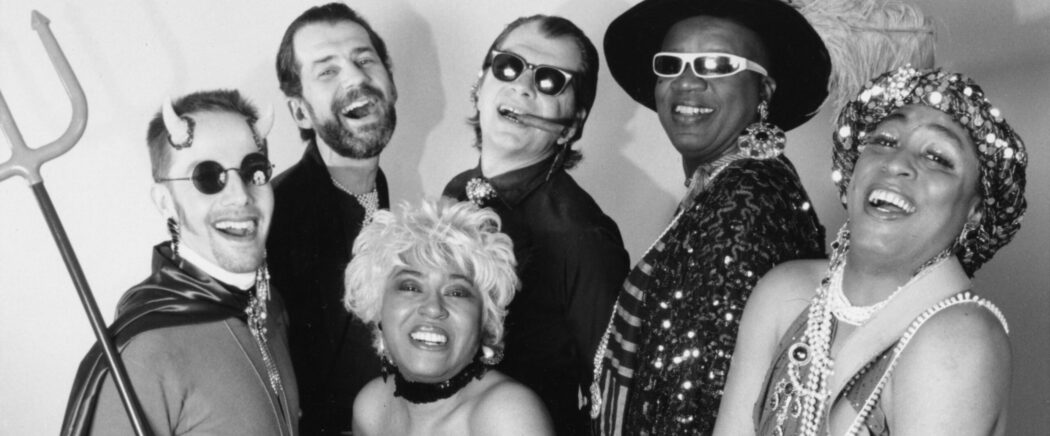“You Don’t Hide Beautiful Things in Closets”
Hot Peaches performed in the bars, clubs, theatres, lofts, churches and streets of downtown New York from the early 70s to the early 2000s. The group’s persistent presence over decades in New York is underwritten, in both queer history and genealogies of performance. Against a backdrop of ongoing American cultural and political hostilities to queer and trans survival, Hot Peaches made work with explicitly queer content and a campy, spectacular DIY sensibility, and were heralded as New York’s first self-defined gay theatre company.
Initially inspired by a performance by San Francisco’s Angels of Light, the Peaches’ co-founder and primary writer/director Jimmy Camicia prioritized personality over anything so conventional or replicable as “talent.” In a press release for 1973’s “Alice,” Jimmy writes:
The Hot Peach Company brings you up by leading you down, deep into the caverns of their subterranean, honky-tonk-trash culture. But no Warhol superstars here. They are too real for that game. Sure, many of the Hot Peaches are prostitutes and hustlers, gays and welfare cases, transvestites and revolutionists of all shapes, forms and colors. … Fully aware of why and how society drove them into the pits of the New York underworld, the Hot Peaches seek out and fully accept the humor and folly of it all. … Their productions portray, along with the camp and color, some of the seediest of the underground, some of the roughest, some of the most tragic – but always with a song, a dance, and a beautiful, healthy laugh. And the culture they exist in is a rich one.
The Peaches built work around an ever-evolving roster of performers – including Marsha P. Johnson, Peggy Shaw, Wilhelmina Ross, and International Chrysis – mounting full-length original productions along with cabaret acts, rent parties and fundraisers, poetry readings, and gay revues. The group had an open door policy, encouraging friends and audience members to join up. Hot Peaches’ longevity is in part a result of their changeability, as the group proved expansive enough to evolve for different members, venues, and styles.
Starting in the early 70s, Jimmy also served as the group’s archivist. Like so many queer archives, the Hot Peaches archive started as boxes carted from rental to rental, stored under beds and in closets. Living towards an archive has been a crucial strategy of queer artists, anticipating a future in which these scrappy remnants will be read with care and collaged into an approximation of the experiences they stand in for.
The Hot Peaches archive maintains a DIY, lived-with materiality, with coffee stains and torn edges. Candid closeups of smiling Peaches and friends are mixed in with publicity shots and performance photos. Slips of paper are tucked into the mix, bearing Jimmy’s commentary in his casual scrawl: “This party was as miserable as it looks – worse!” and “I guess she really thought she was gorgeous. She was certainly elegant. Mind you, that wig had seen better days.”
The archive holds not only the ephemera detailing decades of Hot Peaches shows – scripts, photos, videos, posters, promotional materials – but also evidence the precarities faced by the group. Scripts and programs act as scrap paper for the endless back-of-the-envelope math needed to keep everything running; and reviews praising the Peaches’ vibrant spectacles are kept alongside news articles proposing AIDS quarantine camps and justifying gay witch hunts – reflecting the constant threats to the glittering, convivial space they carved out for themselves and their audiences onstage. These sharp, self-aware contrasts are part of what made the Peaches’ joyful, defiant work so rich, and their long-running presence so vital. Hot Peaches’ work and archive offer deeply relevant insights toward queer and trans survival for our current hostile times, against the ongoing repetitions of history.
J de Leon is co-curator of NYU Skirball and NYU Division of Libraries’ “Archives Onstage” series.
